Huskies can survive in temperatures as low as -60°F, thanks to their thick double coats and hardy nature.
| Minimum Temperature Threshold | -60 degrees Fahrenheit (-51 degrees Celsius) |
| Typical Comfort Range | -20 to -60 degrees Fahrenheit (-29 to -51 degrees Celsius) |
| Undercoat Feature | Dense, wool-like |
| Topcoat Feature | Long, water-resistant |
| Tolerance to Cold | High; Bred for cold climates |
| Origin Climate | Siberia; Extremely cold environments |
| Historical Use in Cold | Sled pulling in Arctic regions |
| Outdoor Shelter Needs | Insulated and Elevated |
| Activity Level in Cold | Remains high; Huskies require exercise even in cold weather |
Siberian Huskies are equipped with a remarkable double coat that plays a crucial role in protecting them from extreme cold. The dense undercoat acts as an insulating layer, trapping body heat and keeping the dog warm in frigid temperatures.
The longer topcoat helps repel moisture and snow, further enhancing the insulation provided by the undercoat. This unique double-layered fur serves as a natural barrier against harsh weather conditions, allowing huskies to thrive in some of the coldest environments on the planet.
How cold can huskies survive
It’s important to understand that the double coat not only provides insulation in cold weather but also offers effective heat regulation in warmer climates.
The air trapped between the two layers acts as a thermal buffer, safeguarding the husky from both extreme heat and cold. Regular grooming is essential to maintain the coat’s health and maximize its insulating properties.
Brushing the coat helps to remove loose fur, preventing matting and facilitating air circulation within the layers, which is crucial for regulating body temperature.
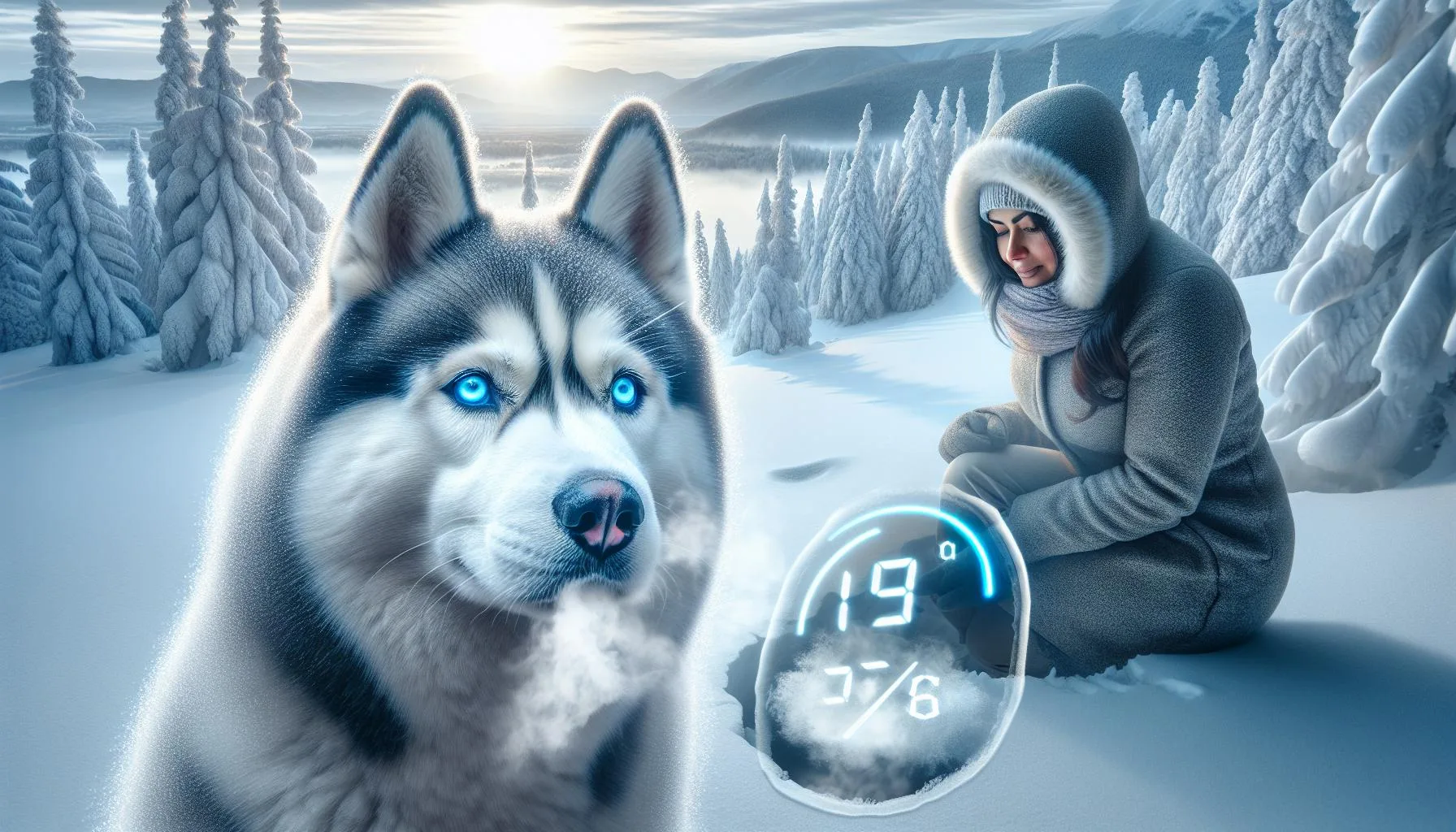
Temperature Tolerance in Huskies
Huskies have a remarkable ability to withstand cold temperatures, thanks to their thick double coat, which provides insulation against extreme cold. Their tolerance for low temperatures is influenced by various factors, including acclimatization, physical activity, and overall health.
The breed has been known to survive in temperatures as low as -60°F, showcasing their exceptional cold resistance. However, it’s important for husky owners to monitor their pets closely in frigid conditions to ensure their safety and well-being.
Providing appropriate outdoor shelter, a high-calorie diet, and regular veterinary check-ups are crucial in enabling huskies to thrive in cold weather. Additionally, understanding the signs of cold stress and taking immediate action when necessary are essential aspects of caring for huskies in low temperatures.
How cold can huskies survive
Huskies are renowned for their ability to endure freezing temperatures, and as owners, it’s vital to recognize and respect their natural resilience while also taking proactive measures to safeguard their health in cold weather.
.
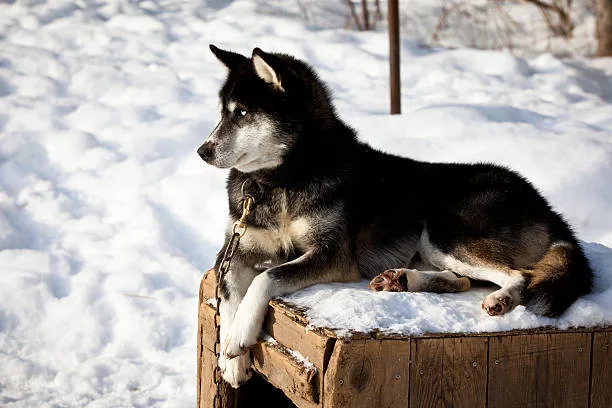
The Importance of Acclimatization
Acclimatization is a crucial factor in understanding how cold can huskies survive. Gradual exposure to colder temperatures helps enhance a Husky’s tolerance to the cold.
This process allows their bodies to adapt and develop mechanisms to cope with extreme cold. Owners should be mindful not to expose their Huskies to abrupt extreme cold, as this can be detrimental to their well-being.
By acclimatizing them slowly, Huskies can better handle and thrive in colder climates. Additionally, acclimatization plays a vital role in their overall health and well-being, ensuring that they are better equipped to withstand colder temperatures without any adverse effects.
Ultimately, acclimatization is a key part of responsible Husky care, allowing them to make the most of their natural cold-resistant abilities.
How cold can huskies survive
By gradually acclimating Huskies to colder temperatures, owners can help them develop the necessary tolerance for extreme cold.
- Acclimatization enables Huskies to adapt and thrive in colder climates.
- Owners should avoid exposing Huskies to abrupt extreme cold, as it can be harmful to their well-being.
- Gradual acclimatization contributes to the overall health and well-being of Huskies, ensuring they can withstand colder temperatures without adverse effects.
.
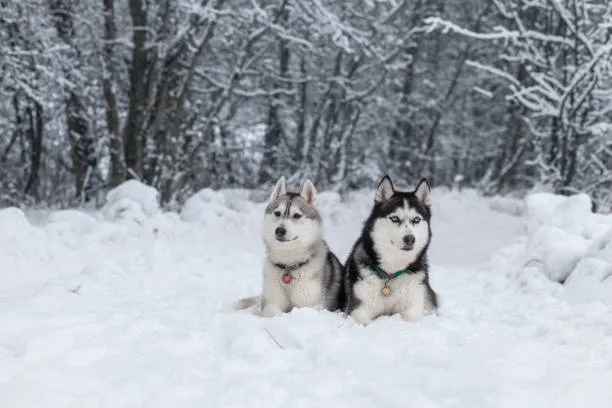
Limitations and Risks of Cold Weather
Huskies are renowned for their remarkable tolerance to cold weather, but it’s essential for owners to recognize that even these snow-loving dogs have their limitations and are not invincible to the risks associated with extreme cold. While their thick double coat provides insulation against the chill, certain factors can still pose dangers to their well-being.
For instance, despite their ability to withstand subzero temperatures, prolonged exposure to extreme cold can lead to the risk of frostbite and hypothermia in huskies. Additionally, strong winds and wet conditions can further challenge their ability to regulate body temperature, potentially putting them at risk for cold-related health issues.
Owners must remain vigilant in observing their husky for any signs of distress or discomfort in cold weather, keeping in mind that even these cold-weather experts have their limits. Awareness of these limitations and potential risks equips owners with the knowledge needed to provide appropriate care and protection for their husky in harsh winter conditions.
Understanding the limitations and potential risks of cold weather for huskies is crucial for responsible pet ownership.
Despite their cold-resistant nature, these dogs are not immune to the dangers posed by extreme temperatures and environmental conditions.
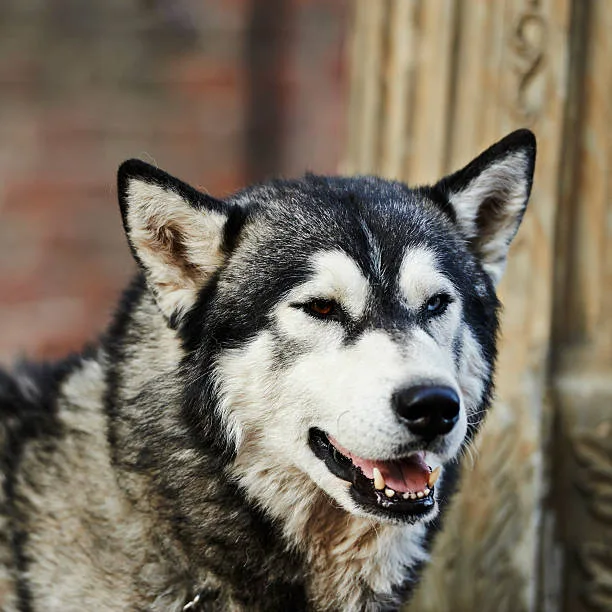
Recognizing Signs of Cold Stress in Huskies
Huskies are known for their incredible tolerance to cold temperatures, but it is crucial for owners to recognize signs of cold stress in these dogs. One of the clear indicators of the husky being unable to cope with the cold is excessive shivering.
This visible sign of discomfort should prompt immediate action to protect the husky from further exposure to extreme cold. Another sign can be a slowed or lethargic behavior, which may indicate that the cold is affecting the husky’s energy levels and overall well-being.
Additionally, if the husky starts to curl up or seek shelter in an effort to conserve body heat, it’s a strong signal that the cold is becoming too challenging for them. It is important to be observant and regularly monitor the husky’s behavior, especially when exposed to colder temperatures, to ensure their well-being..
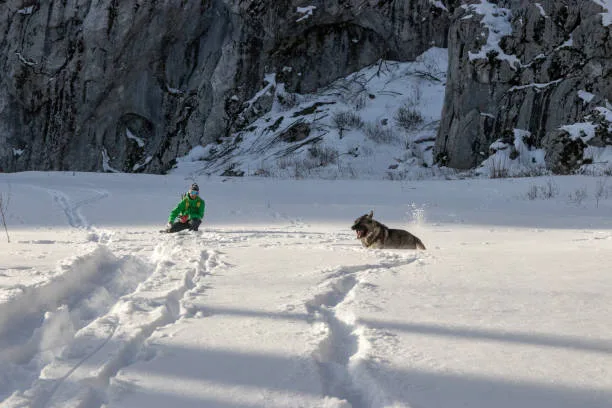
Outdoor Shelter and Bedding
Providing appropriate outdoor shelter and bedding is crucial in ensuring that huskies remain warm and protected when they spend time outside in the cold. Huskies are built to withstand extremely low temperatures, but they still require a safe retreat from harsh weather conditions.
A sturdy and insulated doghouse that is elevated off the ground is essential. The structure should be large enough for the husky to stand, turn around, and lie down comfortably, but not too spacious to retain the dog’s body heat effectively.
Additionally, the entrance should be sheltered from strong winds to minimize cold drafts. Placing warm bedding made from dense, insulating materials such as straw or blankets inside the shelter is vital for keeping the husky cozy.
It’s important to regularly inspect the shelter and bedding to ensure they remain dry and clean, as dampness can increase the cold’s impact. Finally, it’s advisable to position the shelter in a location that receives ample sunlight during the day and is shielded from prevailing winds, offering the husky a comfortable outdoor haven.
- Provide a sturdy and insulated doghouse, elevated off the ground.
- Ensure the doghouse is appropriately sized for the husky’s comfort and insulation.
- Place warm bedding inside the shelter, using materials like straw or blankets.
- Regularly inspect the shelter and bedding to keep them dry and clean.
- Position the shelter in a location that receives ample sunlight and is shielded from prevailing winds.
.
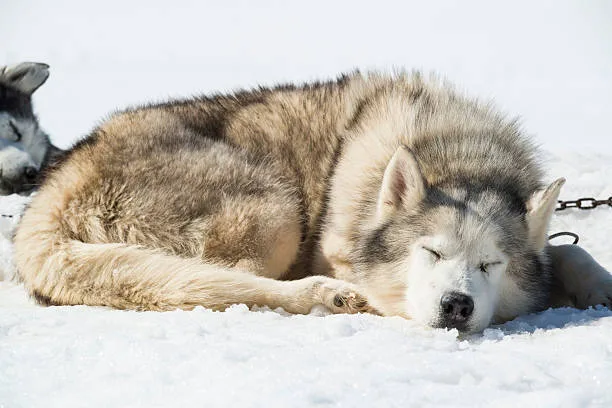
Dietary Considerations in Cold Weather
During winter, huskies may require adjustments to their diet to support their energy needs in cold temperatures. How cold can huskies survive depends on their ability to maintain internal warmth, which may require a higher calorie intake during winter months.
Their diet should be tailored to provide the extra energy required for staying warm and active in chilly conditions. It’s important to consider a high-quality, nutrient-dense diet that supports their metabolism and sustains their energy levels.
Additionally, ensuring an adequate intake of essential fatty acids can help maintain their coat’s insulating properties and overall skin health. As a responsible husky owner, it’s crucial to work with a veterinarian to determine the specific dietary adjustments needed to keep a husky healthy and thriving in the cold.
Remember that a husky’s diet in cold weather should reflect their increased energy requirements.
- Consider a high-quality, nutrient-dense diet to support their metabolism and energy levels.
- Consult with a veterinarian to determine specific dietary adjustments needed for cold weather.
- Ensure adequate intake of essential fatty acids to maintain coat insulation and skin health.
.
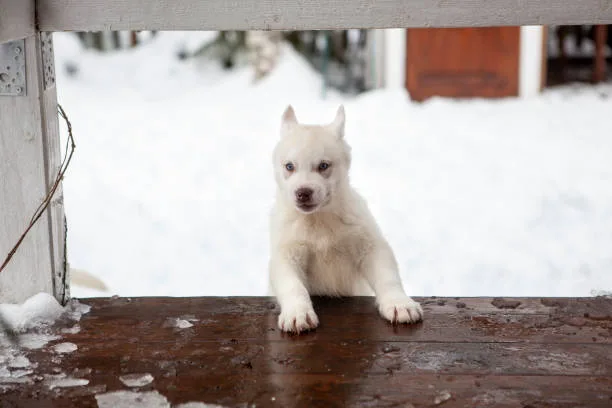
Exercise and Activity in the Cold
Huskies are known for their high energy levels and love for physical activity, making regular exercise a crucial part of their routine regardless of the weather. When it comes to exercising in the cold, it’s important to consider how cold can huskies survive, as they are naturally adapted to chilly temperatures.
It’s essential to monitor the duration and intensity of outdoor activities, especially in freezing conditions, to prevent overexposure to extreme cold.
Reddit How cold can huskies survive
Protecting their paws from ice and salt is also vital. Investing in protective boots can help shield their paws from the harsh elements.
Additionally, it’s important to ensure that Huskies have access to fresh water during and after outdoor activities, as staying hydrated is essential, even in cold weather.

Annual Health Checks and Cold Weather
Huskies are naturally resilient in cold weather, but it’s essential to prioritize their well-being through regular veterinary check-ups. These health evaluations play a vital role in ensuring that a Husky is equipped to withstand cold temperatures and identify any underlying conditions that may be exacerbated by the cold.
From checking for cardiovascular health to monitoring joint function, annual health checks allow for the early detection of any issues that could affect a Husky’s ability to thrive in cold conditions. Additionally, these check-ups provide an opportunity to discuss preventive measures, such as vaccinations or parasite control, which are crucial for maintaining a Husky’s overall health and cold tolerance.
Overall, staying proactive with annual health checks is crucial for safeguarding a Husky’s well-being and ability to endure cold climates.
On Quora about: How cold can huskies survive
Owners should also consider discussing any behavioral changes or signs of discomfort in colder temperatures with their veterinarian, as these could indicate specific health considerations for their individual Husky.
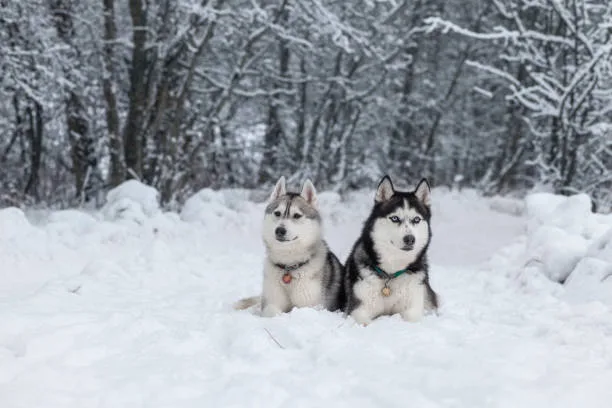
Optimizing Husky Coat Care During Winter
Huskies have a unique double-layered coat that requires specific care during winter to maximize its insulation properties and maintain skin health. Grooming plays a crucial role in optimizing the Husky’s coat for cold weather.
Regular brushing helps to remove loose fur and prevent matting, which can affect the fur’s insulation capabilities. It’s important to use a proper brush to reach the dense undercoat and the longer topcoat.
Additionally, bathing should be minimized during winter to preserve the natural oils that provide insulation. Using a mild dog shampoo and thorough drying after any exposure to moisture can help maintain the coat’s health and insulating properties.
Trim the fur around the paws to prevent ice buildup and regularly check for any signs of irritation or dryness. Lastly, providing a balanced diet with essential nutrients promotes healthy coat growth, further enhancing the Husky’s ability to withstand cold temperatures.
American Kennel Club: How cold can huskies survive
Overall, regular grooming, selective bathing, and a balanced diet are essential components of optimizing a Husky’s coat for the winter, ensuring that they are well-protected and insulated during cold weather.
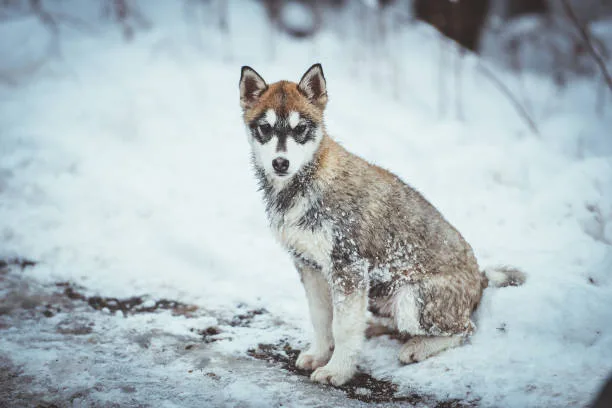
Enhancing Husky Vitality with Adjusted Winter Nutrition
Huskies require adjusted nutrition during the winter months to support their increased energy and metabolic needs. As the temperature drops, huskies’ bodies work harder to maintain their internal warmth, resulting in higher calorie requirements.
To enhance their vitality in cold weather, it’s crucial to provide a diet tailored to their specific needs. This may include increasing their calorie intake through nutrient-rich foods while ensuring a balanced and complete diet.
Additionally, maintaining proper hydration is essential, as the dry winter air can lead to increased water loss through respiration. By carefully adjusting their nutrition to accommodate the colder climate, husky owners can help their pets stay healthy and energetic throughout the winter.
On Medium about: How cold can huskies survive
Huskies require adjusted nutrition during the winter months to support their increased energy and metabolic needs. As the temperature drops, huskies’ bodies work harder to maintain their internal warmth, resulting in higher calorie requirements.
To enhance their vitality in cold weather, it’s crucial to provide a diet tailored to their specific needs.
- This may include increasing their calorie intake through nutrient-rich foods while ensuring a balanced and complete diet.
- Additionally, maintaining proper hydration is essential, as the dry winter air can lead to increased water loss through respiration.
By carefully adjusting their nutrition to accommodate the colder climate, husky owners can help their pets stay healthy and energetic throughout the winter..
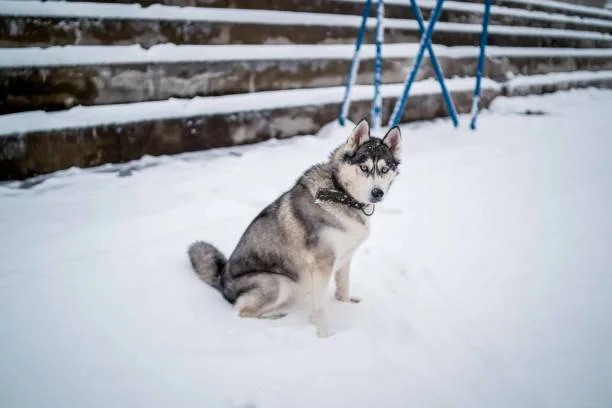
Comprehensive Winter Health Management for Huskies
Huskies require comprehensive winter health management to thrive in cold conditions. This includes monitoring for signs of hypothermia and frostbite, maintaining paw health to avoid cracks or infections, and outfitting them with appropriate winter apparel.
Providing regular grooming to maximize insulation properties and skin health is crucial, as it helps address shedding and matting that can affect fur insulation. Additionally, ensuring a warm and safe indoor environment for Huskies during extreme cold conditions, such as appropriate bedding, maintaining room temperature, and understanding breed-specific behavior when kept indoors for extended periods, is essential for their overall well-being.
Regular veterinary check-ups to ensure that a Husky is in good health to withstand cold temperatures and to prevent common cold weather health issues should also be prioritized. High-calorie diet adjustments and tailored nutrition to support their high activity levels are also necessary for enhancing their vitality during winter..
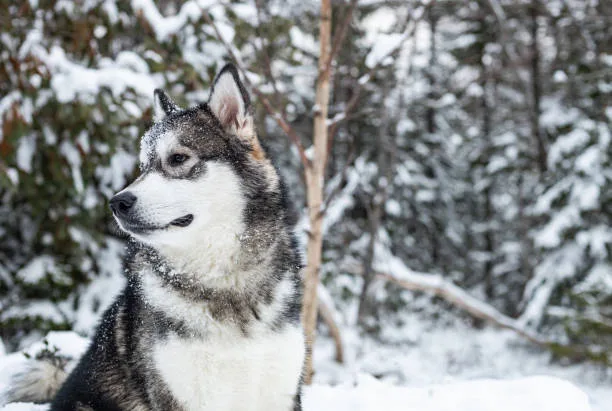
Ensuring Husky Comfort and Safety Indoors
Huskies are incredibly resilient and can tolerate very low temperatures, but when it comes to staying indoors during extreme cold conditions, it’s essential to ensure their comfort and safety. While they may be naturally suited to cold climates, providing a warm and secure indoor environment is still crucial for their well-being.
Huskies have a thick double coat that insulates them from cold weather, but they can still benefit from a cozy indoor space, especially during severe cold snaps. Here are some key factors to consider when ensuring a Husky’s comfort and safety indoors.
1.
Indoor Temperature: Maintaining a moderate room temperature is important for Huskies, especially during exceptionally cold weather. While they are well adapted to colder climates, providing a warm indoor environment can help them remain comfortable and prevent any discomfort.
2.
Appropriate Bedding: Huskies appreciate a comfortable and insulated bed to curl up in when indoors. Providing a cozy and well-padded bed can help them stay warm and relaxed, especially during periods of prolonged indoor stay.
3.
Breed-Specific Behavior: Understanding the unique behavior of Huskies when kept indoors for extended periods is crucial. Even though they are bred for the cold, Huskies still require mental and physical stimulation, so engaging them in interactive play and exercise can contribute to their overall well-being.
4.
Maintenance of Indoor Environment: Keeping the indoor living space clean, dry, and free from drafts is essential for Husky comfort. Regularly maintaining the indoor environment helps to protect them from any potential health hazards that may arise from cold and damp conditions.
5.
Monitoring Comfort Levels: Observing the Husky’s behavior and comfort levels indoors is key to ensuring their safety and well-being. If they appear restless or uncomfortable, it’s important to make necessary adjustments to provide a more suitable indoor environment for them.

Conclusion: Balancing Care with Natural Abilities
Huskies are known for their remarkable ability to endure extremely cold temperatures, with their thick double coat providing insulation against harsh weather conditions. Understanding their natural tolerance to cold is crucial for responsible care.
It’s essential for Husky owners to respect and accommodate their pet’s innate capability to withstand the cold while also taking proactive measures to ensure their well-being. This involves providing adequate shelter, monitoring their health, adjusting their diet and exercise routine, and being vigilant for signs of cold-related stress.
By striking a balance between their natural resilience and attentive care, owners can ensure that their Huskies thrive in cold weather conditions.

Leave a Reply